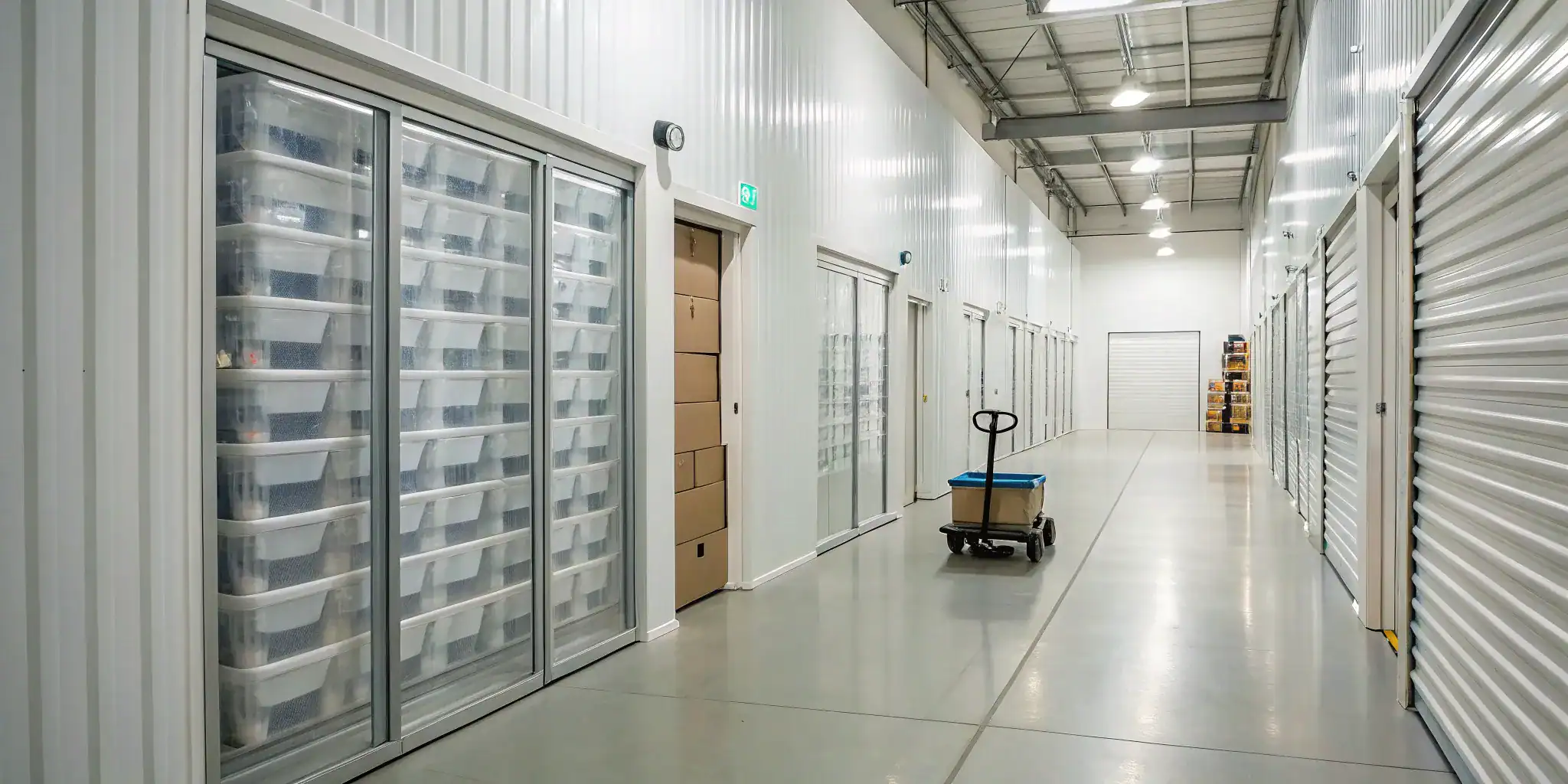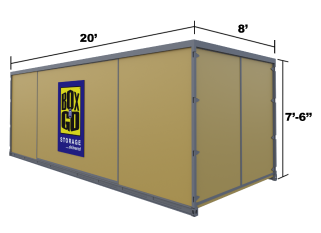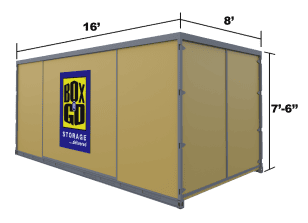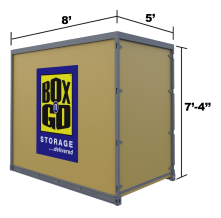Smart Business Storage Services: A Guide for Growing Companies

Finding extra space for your business usually means a full day of hard work. You rent a truck, load it up, drive to a storage facility, and then unload everything all over again. It’s a process that pulls you away from what matters most—running your company. But what if the storage unit came directly to your door? This is the simple idea behind modern business storage. These business-friendly storage solutions eliminate the hassle, giving you back valuable time. This guide covers the different types of commercial storage and facilities services, from classic units to convenient portable containers.
- Save 50% on move-in
- No truck rental
- Ground level










- Save 50% on move-in
- No truck rental
- Ground level
Box-n-Go Portable Storage Unit Sizes

Key Takeaways
- Gain Financial Flexibility: Business storage offers a cost-effective alternative to expensive commercial leases. It allows you to get the space you need for inventory or equipment without a long-term commitment, freeing up capital and your primary workspace for core business activities.
- Prioritize Convenience to Save Time: The right storage solution should simplify your logistics, not add to them. Portable storage containers that come to you eliminate the need for truck rentals and double-handling items, letting you focus your energy on running your business.
- Make Your Unit an Extension of Your Office: A little organization goes a long way. Create a simple inventory list, label every box clearly, and leave a walkway for easy access. This turns your storage space from a holding area into a functional, streamlined asset you can rely on.

What Are Business Storage Services?
If you feel like your business is bursting at the seams, you’re not alone. Many companies eventually need more room than their current space allows. That’s where business storage comes in. It’s a practical way to get the extra space you need without signing a long, expensive lease for a larger office or warehouse. Think of it as an on-demand extension of your workspace, designed to hold everything from inventory and equipment to important documents and seasonal items. These services offer a secure and flexible solution to help you manage your assets and keep your primary workspace organized and efficient.
How Business Storage Works
Think of business storage as a dedicated, off-site space for all the company items you don’t have room for on-premises. This could be anything from excess inventory and archived documents to specialized equipment or seasonal decorations. These services are designed to simplify the management of business items by providing a flexible and straightforward way to handle your physical assets. Instead of being crammed into a back room or overflowing closet, your items are kept in a secure unit. This frees up your valuable workspace, making it easier for you to run your business without the clutter.

Signs You Need a Business Storage Solution
So, why would your business need storage? The most common reason is simply running out of space. As your company grows, so does your inventory, paperwork, and equipment. Instead of paying for a larger commercial lease, you can use a storage unit to handle the overflow, which is often a more cost-effective solution. Beyond just saving money, using storage helps you concentrate on what really matters: your core operations. When you’re not dealing with clutter, your team can stay focused and productive. This is especially true during a transition, as dedicated storage services can make office moves easier and less stressful for everyone involved.
Types of Business Storage Solutions
When your office, stockroom, or workshop starts to feel cramped, finding extra space becomes a top priority. But not all storage is created equal. The best solution for your business depends entirely on what you need to store, how often you need to access it, and how much work you’re willing to put in. From traditional drive-up units to convenient portable containers, understanding the landscape of business storage helps you make a smart decision that saves you time, money, and a whole lot of hassle. Let’s walk through the main types of storage facilities so you can find the perfect fit for your company’s assets, inventory, and equipment.
What Kinds of Businesses Use Storage?
You might be surprised by the sheer variety of companies that rely on storage. It’s not just for e-commerce shops with overflowing inventory or retailers stashing seasonal products. Professional services, like law firms and accounting offices, use storage to securely archive sensitive documents, helping them meet compliance requirements while freeing up expensive office space. Even healthcare providers and pharmaceutical reps need a clean, organized place to keep records and samples accessible. The common thread is the need for a flexible, secure space that adapts to their specific operational demands without the commitment and cost of a long-term commercial lease, keeping their primary workspace focused on productivity.
Store on your driveway or inside our secure facility. Load/unload only once. Ground level access.
Beyond the office, hands-on businesses also find storage indispensable. Independent contractors store tools and materials, keeping their work vehicles organized and their homes clutter-free. Event planners use units to hold decorations and equipment between gigs, while restaurants can store non-perishable supplies and seasonal furniture without crowding their kitchens or dining areas. Essentially, any business that experiences fluctuations in inventory, equipment, or paperwork can benefit from a dedicated storage solution. It allows them to turn an off-site space into a functional, streamlined extension of their workspace, ready whenever they need it.
Traditional Self-Storage Units
This is the classic option most people picture when they think of storage. Self-storage units are private spaces you rent inside a larger facility where you lock and manage the unit yourself. While they are a common solution, they require you to handle all the logistics. That means renting a truck, loading it at your business, driving to the facility, and then unloading everything into the unit. It’s a hands-on approach that gives you control but demands a significant amount of time and physical effort—essentially, you’re moving everything twice. For a busy business owner, that’s a major investment of resources that could be spent elsewhere.

Protecting Valuables with Climate Control
If you’re storing anything sensitive, this is a feature you can’t ignore. Climate-controlled storage maintains a consistent temperature and humidity level, protecting your items from extreme heat, cold, and moisture. Think about delicate electronics, important paper documents, wood furniture, or valuable artwork—all of which can be damaged by environmental changes. This isn’t usually a standalone type of storage but rather a premium feature offered at many self-storage facilities. It provides peace of mind that your most important assets are shielded from the elements, which is crucial for preserving their condition and value over time.
Specialized Commercial Storage Facilities
Sometimes, you just need a dedicated space for business items without signing a long-term commercial lease. Specialized commercial storage is designed for exactly that, offering a home for your excess inventory, archived documents, or bulky equipment. This option can be a smart financial move, as it’s often much cheaper than renting a bigger office or a private warehouse. It gives you the flexibility to store business-specific materials securely, helping you manage your inventory and operations without the overhead of a larger commercial property. It’s an ideal solution for growing businesses that need space to expand efficiently.
- Call or order online in minutes
- We deliver storage to you
- Pack at home, at your convinience
- Store on your property or at indoor facility
- Move locally or nationwide
- Call or order online in minutes
- We deliver 16′ and 20′ storage to you
- Pack at home, loading labor available
- Store on your property
- Secured Extra Space
Beyond the Standard Unit: Lockers and Warehouse Spaces
Sometimes a standard storage unit is either too much or not enough. If you only need to store a few boxes of archived documents or some extra tools, storage lockers can be a great, budget-friendly choice. On the other hand, if you’re managing large-scale inventory or heavy equipment, you might be tempted to look at private warehouse spaces. While they offer plenty of room, they usually come with the commitment of a long-term lease and a significant price tag. The best solution should simplify your operations, not lock you into a costly contract. Finding that sweet spot gives you the flexibility to store what you need while keeping your capital free for what matters most—running your business.
On-Site Storage: Portable Containers
For the ultimate convenience, portable storage containers flip the traditional model on its head. Instead of you going to the storage unit, the unit comes to you. With a service like Box-n-Go, renting portable storage units is simple: a container is delivered directly to your business. You can load it at your own pace, eliminating the need to rent a truck or rush to move everything in one day. Once it’s packed, you can keep it on-site for easy access or have it picked up and stored in a secure warehouse. This approach saves you from loading and unloading your items multiple times, making it a highly efficient choice for any business that values flexibility and simplicity.

How Business Storage Can Help You Grow
When you’re running a business, every square foot of your workspace counts. Using a dedicated storage service isn’t just about stashing away old files; it’s a strategic move that can improve your finances, operations, and peace of mind. From freeing up valuable real estate in your office to giving you a flexible solution that adapts to your business’s rhythm, the benefits are well worth exploring.
Save Money and Free Up Space
Renting more office or retail space is a huge financial commitment, often involving long-term leases and high monthly costs. Business storage offers a much more affordable alternative. It’s often cheaper than renting a commercial office space, allowing you to store inventory, equipment, or documents without breaking the bank. This frees up your primary location for revenue-generating activities, whether that’s adding another desk for a new hire or expanding your retail floor. A clutter-free workspace not only looks more professional but also helps your team work more efficiently without unnecessary items getting in the way.
Streamline Your Operations
Think about the time and energy your team spends managing inventory or shuffling equipment around. A business storage unit can act as a central hub for your physical assets, simplifying your logistics. This is especially true with portable storage solutions. For instance, a service like Box-n-Go can deliver a storage container directly to your location. You can load it at your own pace with seasonal inventory, marketing materials, or tools. This eliminates the hassle of renting a truck and double-handling your items, letting you focus on running your business instead of managing a complicated move.
Protect Your Inventory and Assets
Your inventory, equipment, and documents are vital to your business. Leaving them in a crowded stockroom or an unsecured area leaves them vulnerable to damage or theft. Professional storage facilities provide a secure environment to protect these assets. Many containers are built with durable, weather-resistant materials. For example, Box-n-Go containers have multiple latches on each door, including a hasp where you can put your own padlock for exclusive access. This gives you control and confidence that your valuable items are safe from the elements and unauthorized hands, whether the container is at your site or in a secure warehouse.

Find Space That Grows With You
Your business needs will change over time. You might need more space during a busy season or less during a quieter period. Business storage provides the flexibility to adapt without the rigid commitment of a commercial lease. You can easily scale your storage space up or down as your inventory fluctuates. Many providers also offer consolidated storage, allowing you to keep different types of items—like documents, excess inventory, and equipment—all with a single provider. This simplifies billing and makes it easier to manage your assets as your company expands.
How to Choose the Right Storage Provider
Finding the right storage partner is a big decision for your business. It’s not just about finding a space; it’s about finding a solution that fits your workflow, protects your assets, and gives you peace of mind. The right provider can feel like an extension of your own team, making your operations smoother and more efficient. When you’re comparing options, it helps to have a checklist of what really matters. Think about how you’ll use the space, how often you’ll need access, and what level of security your items require. Let’s walk through the key factors to consider so you can make a choice you feel great about.
Check for Convenient Location and Access
When you think of location, you probably picture a map with a pin in it. For traditional self-storage, proximity is a huge deal. You don’t want to drive across town every time you need to grab inventory or equipment. But what if the location came to you? That’s the idea behind portable storage. Companies like Box-n-Go deliver a container right to your door, eliminating the need for truck rentals and long drives. You can keep it on-site for constant access or have it moved to a secure facility. This model redefines what makes a location convenient, putting accessibility in your hands and saving you precious time.

20’ Container – all weather.
Perfect for 3-bedroom residence.
5-7 rooms, furniture, appliances, etc.

16’ Container – all weather.
Perfect for 2-bedroom residence.
3-5 rooms, furniture, appliances, etc.

8’ Container – all weather.
Modular – works for any need.
Each fits 1-1.5 rooms.
Confirm Facility Access Hours
Your business doesn’t always run on a 9-to-5 schedule, so your storage access shouldn’t be limited to it either. Before you commit, find out the facility’s access hours. Many traditional self-storage locations have set times; for instance, U-Haul mentions that most of their locations let you access your items from 5 AM to 10 PM daily. This can be a dealbreaker if you need to grab inventory for an early-morning job or restock after a late-night event. This is another area where portable storage offers more flexibility. If you keep the container at your location, you have round-the-clock access right at your doorstep. If you have us store it at our secure facility, you get free, ground-level access during our warehouse hours—just give us a call to schedule a visit.

What Security Features Matter Most?
Security is non-negotiable when your business assets are on the line. A simple padlock on a flimsy door isn’t enough. Look for comprehensive security that covers all the bases. A great facility should have good lighting, controlled gate access, and surveillance. But don’t forget about the security of the unit itself. For example, Box-n-Go moving containers are built with multiple latches and a hasp for your own heavy-duty padlock, giving you control over who gets in. You want a provider that takes security seriously, protecting your items from both theft and the elements, so you can focus on running your business without worry.
Look for Individual Unit Alarms
While facility-wide cameras and gated access are essential first steps, they monitor the property as a whole. For an added layer of protection that’s specific to your assets, ask if the provider offers individual alarms on their storage units. This feature means that if anyone tries to open your unit without proper authorization, an alarm sounds, immediately alerting the facility staff. It’s a powerful deterrent that goes beyond general surveillance. Some major providers highlight alarms on individual rooms as a key security feature because it provides targeted protection for your specific space. This gives you extra confidence that your inventory, equipment, or sensitive documents are secure, letting you rest easy knowing your unit is individually monitored.
Compare Pricing and Contract Flexibility
Your business needs change, so your storage solution should be able to adapt. Avoid getting locked into rigid, long-term contracts that don’t fit your plans. Look for clear, upfront pricing without hidden fees. The best providers offer flexible terms that let you scale your space up or down as your inventory fluctuates. The ultimate flexibility comes from services that work around your schedule. Having a portable storage unit delivered when you need it and picked up when you’re done simplifies everything. This kind of on-demand service means you only pay for what you need, exactly when you need it, which is a smart move for any budget.
Read Reviews and Gauge Customer Service
Think of customer service as the foundation of your storage experience. When you have a question or need assistance, you want to talk to a helpful, responsive person. A company’s reputation can tell you a lot about what to expect. Before you commit, spend some time reading online reviews and customer testimonials. Are people happy with the service? Do they feel their belongings are safe? Positive feedback is a strong indicator of a reliable company. Strong customer testimonials often highlight the very things you’re looking for—like great security and a smooth process—giving you the confidence that you’re choosing a trustworthy partner for your business.

Inspect for Cleanliness and Maintenance
A clean and well-maintained facility is a sign of a professional, well-run operation. When you tour a storage site or see a delivered container, pay attention to the details. Is the property free of debris? Are the units in good condition? These factors matter because they reflect how well your own items will be protected. A commitment to cleanliness helps prevent pests and protects your inventory from dust and damage. When you’re looking for the ultimate business storage solution, look for a provider that takes pride in its appearance. A clean space shows respect for you and your belongings, ensuring your assets are stored in a quality environment.
Ask About Account Management and Corporate Services
When you’re choosing a storage provider, think of it as hiring a partner, not just renting a box. For a business juggling multiple projects or job sites, the last thing you need is to re-explain your situation every time you call. This is where dedicated account management becomes a game-changer. Having a single point of contact who knows your business—your peak seasons, your typical needs, your billing cycle—streamlines everything. It saves you from administrative headaches and ensures your specific requirements are handled efficiently. This level of personalized service is invaluable for companies that need consistent support and want to focus on their core operations, not on managing storage logistics.
Beyond a dedicated manager, inquire about the corporate services they offer. Can they handle complex logistics, like delivering multiple containers to different job sites and consolidating the billing into one simple invoice? A great provider will offer flexible solutions that adapt to your company’s rhythm. For example, a service like Box-n-Go allows you to easily scale your storage up or down, adding containers during a busy season and sending them back when you’re done. This adaptability is crucial for managing fluctuating inventory or project-based needs without getting locked into a rigid contract. It’s about finding a provider that offers solutions that grow with you, saving you time and money.
Making the Most of Your Business Storage
Renting a storage unit is one thing; using it well is another. A little planning can turn your storage space from a cluttered closet into a streamlined extension of your business. By thinking strategically about how you fill and manage your unit, you can save yourself time, prevent headaches, and make sure you can always find what you need, right when you need it. Here are a few simple habits that will help you get the most out of your space.

Organize Your Unit for Easy Access
Think of your storage unit like a library, not a junk drawer. Before you move anything in, create a layout. Leave a clear walkway down the middle so you can reach items in the back. Use sturdy, uniform boxes that you can stack safely without them toppling over or crushing what’s inside. Place heavier boxes on the bottom and lighter ones on top to maintain stability. It’s also a good idea to leave a small gap between your belongings and the unit’s walls to allow for air circulation. A well-organized unit is easier to check on and is one of the key features for peace of mind when using storage.
Create a Simple Inventory System
You’ll thank yourself later for creating a simple inventory system. This doesn’t have to be complicated—a spreadsheet or a note on your phone works perfectly. For each box, list the contents and assign it a number. Then, label the box with that same number on all visible sides. This simple step means you can check your list to find exactly what you’re looking for without tearing open every box. An organized inventory system is crucial for quickly locating items, saving you a ton of time and frustration when you need to retrieve something specific.
Ask About Extra Services and Amenities
Modern storage providers often offer more than just an empty room. Ask your facility about extra services that can make your life easier. Many offer flexible short-term and long-term storage options that can be adjusted as your business needs change. Some facilities will even accept deliveries on your behalf, so you don’t have to be there to sign for a shipment. Exploring these additional services can help you integrate your storage unit directly into your daily operations, turning it into a valuable logistical asset rather than just a place to keep extra stuff.
What to Look For in Storage Security
When you’re storing valuable business assets, inventory, or documents, security should be at the top of your checklist. It’s about more than just a lock on a door. True security is a multi-layered approach that protects your belongings from theft, damage, and environmental hazards. A great storage provider will be transparent about their security measures and welcome your questions.
Before you commit to a facility, take the time to assess its security features thoroughly. Ask for a tour and pay close attention to the details. Does the facility feel safe and well-maintained? Are the security systems modern and functional? Your peace of mind depends on finding a provider that takes the protection of your items as seriously as you do. Here are the key areas to focus on.

Continuous Video Surveillance
A secure facility should have comprehensive video surveillance running at all times. Look for visible cameras covering key areas like entrances, exits, hallways, and loading docks. Good lighting is just as important, as it deters potential thieves and ensures that cameras can capture clear footage day or night. A facility that offers a poorly lit or unmonitored environment is a major red flag. When you tour a potential storage location, make a point to check for these features to ensure your items are watched over around the clock.
Secure Gated and Keypad Access
Security starts at the property line. Look for facilities with perimeter fencing and electronic gate access that requires a unique code for entry and exit. This creates a log of who is on the property and when. Beyond the main gate, your individual unit needs to be secure. For example, Box-n-Go containers feature three heavy-duty latches, including a central hasp where you can place your own high-quality padlock. This ensures that you, and only you, have the key to your unit, giving you complete control over who can access your belongings.
We deliver the best storage solutions. No gimmicks:
- No truck to rent. We deliver storage to you!
- Load/Unload only once.
- Pay only for space you use.
- Secure, climate-friendly facility.
- Drive-up access
No Truck to rent…EVER!
- Save money and time.
- Reduce the risk of accidents and injuries.
- No need to pay for gas, insurance & mileage!
Load ONCE Storage Solution!
- You only need to load your belongings once!
- No need to load and unload it all again into a storage unit.
- All containers come with easy ground level access!
Pay Only for the Space You Use!
(if storing at our facility)
- No not need to guess on how much space you actually need.
- Order an extra 8’ x 5’ unit. Do not use it – do not pay for it.
Secure, Climate-Friendly Facility!
- Highest degree of security and protection.
- Our 8’ x 5’ units are breatheable – no mold or mildew.
- No funky smell when your belongings return.
EASY Drive-Up Access!
(if storing at our facility)
- Access your units at ground level.
- No elevators, ramps, stairs to climb.
- Schedule access appointment & drive straight to your units.
Understand Your Insurance Options
Even the most secure facilities can’t prevent every possibility, like natural disasters. That’s why it’s essential to understand the insurance policies in place. Ask the storage provider what their liability coverage includes and what it doesn’t. Many facilities offer their own insurance plans for an additional fee. It’s also a great idea to check with your own business insurance agent to see if your existing policy covers items stored off-site. Having a clear understanding of the available insurance options ensures you’re protected against loss or damage.
Confirm Pest and Climate Control Measures
Security isn’t just about keeping people out; it’s also about protecting your items from pests and the elements. A clean, well-maintained facility with a proactive pest control program is a must. For sensitive items like electronics, documents, or wood furniture, moisture can be a serious threat, leading to mold and mildew. While climate-controlled units are one solution, how you pack is your first line of defense. Using sturdy, sealed plastic bins instead of cardboard boxes can add a significant layer of protection. Stacking boxes securely on pallets also keeps them off the floor and away from potential moisture.
How Much Does Business Storage Cost?
Figuring out the cost of business storage can feel like a puzzle, but it’s simpler than you might think. The price isn’t just a random number; it’s based on a few key factors that you can control. Once you understand what goes into the cost, you can create a budget that works for your business without any surprises. Think of it as an investment in your company’s efficiency and organization. A good storage solution frees up valuable workspace and protects your assets, which is always a smart business move. Let’s walk through what determines the price and how you can plan for it.

What Determines the Price?
The two biggest factors that shape the cost of business storage are the size of the unit and its location. Generally, you can expect to pay anywhere from $50 to $500 per month. The more space you need, the higher the price will be. When you compare this to the cost of leasing additional commercial office space, self-storage is often a much more affordable and flexible option. You aren’t locked into a long-term lease and can choose a unit size that fits your immediate needs and budget.
However, don’t let price be your only guide. Some facilities offer what seems like a great deal, but they cut corners on essentials. A “safe” place might have poor lighting, flimsy gate access, or no climate control, leaving your inventory vulnerable to theft or weather damage. True security means having features like controlled access and a well-maintained environment. Prioritizing a provider with strong moving container security ensures your business assets are genuinely protected, giving you peace of mind that’s worth the investment.
Location-Based Price Differences
Just like with real estate, location plays a huge role in the cost of a storage unit. A facility in a bustling city center will almost always be more expensive than one in a suburban or rural area. According to Extra Space Storage, business storage units can range from $40 to $600 a month, with the price heavily influenced by where the unit is located. This is why it’s so important to weigh convenience against cost. A cheaper unit an hour away might seem like a good deal, but the time and gas money you spend getting there can add up quickly, canceling out any initial savings.
The Added Cost of Climate Control
If your business deals with sensitive items, you’ll want to consider climate control. This feature maintains a stable temperature and humidity level inside the unit, protecting things like electronics, important documents, wood furniture, or artwork from damage caused by extreme heat or cold. As you might expect, this extra protection comes at a price. You can typically expect a climate-controlled unit to add an extra $25 to $50 to your monthly bill. It’s a worthwhile investment for preserving the value and condition of your most delicate assets, ensuring they remain in perfect shape no matter the weather outside.
Comparing Self-Storage and Warehouse Costs
When you need a lot of space, you might find yourself choosing between traditional self-storage and a commercial warehouse. Warehouses are built for large-scale inventory and often come with extra services like packing, shipping, and on-site staff. This full-service approach and enhanced security make them a more expensive option. Self-storage, on the other hand, is a more hands-on, affordable solution. A hybrid model like portable storage can offer a middle ground. For instance, with Box-n-Go, your container is stored at a large, secure warehouse, but you get the convenience and control of packing it yourself right at your business location.

How to Budget for Your Storage Needs
Budgeting for storage is all about planning ahead and finding a solution that adapts to your business. If your inventory changes with the seasons, look for providers that offer flexible arrangements. Many businesses save money by using “seasonal storage,” allowing them to scale their space up or down as needed throughout the year. This prevents you from paying for empty space during your slower months. Most companies, including us at Box-n-Go, make it easy to get a free quote online or over the phone, so you can gather numbers without any commitment.
Another great tip is to remember that your storage unit is a business expense. That means the money you spend on it can often be claimed as a business tax deduction, which can help offset the cost come tax season. When you’re planning your budget, factor in not just the monthly fee but also the value of what you’re storing. Protecting your inventory and equipment from damage or theft is a crucial part of your financial planning, and a secure storage unit is an essential tool for doing just that.
Finding Introductory Deals and Discounts
One of the best ways to keep your storage costs down is to look for introductory deals. Many storage companies offer special rates for the first month or two to attract new customers, so it’s always worth asking what promotions are available. Beyond initial discounts, using a storage unit is a smart financial strategy. It’s a cost-effective alternative to signing an expensive, long-term lease on a larger commercial space. This approach allows you to get the room you need for inventory or equipment while freeing up capital for other parts of your business. To find the best value, get free quotes from a few different providers, including us at Box-n-Go, to compare prices and services directly.
Can You Deduct Business Storage on Your Taxes?
Yes, in most cases, you absolutely can. If you rent a storage unit exclusively for business purposes, the cost is generally considered a deductible operating expense. This is a fantastic benefit that can help lower your overall tax burden. The IRS allows you to deduct ordinary and necessary expenses for running your trade or business, and for many companies, storage fits that description perfectly. This applies whether you’re storing inventory, archived documents, tools and equipment, or even company vehicles. It’s a practical way to manage your assets while also gaining a financial advantage.
Think of it this way: the money you spend to keep your business organized and your inventory safe is part of the cost of doing business. Just be sure to consult with a tax professional to understand how this applies to your specific situation. They can offer guidance based on your business structure and ensure you’re claiming everything correctly. Keeping clear records of your rental payments and how you use the space will make tax time much smoother and help you justify the deduction if you ever need to. It’s a simple step that makes a big difference.

Rules for Claiming a Tax Deduction
To claim your storage unit costs on your taxes, the most important rule is that the space must be used for your business. This means you need to keep meticulous records to back up your claim. Hold onto all your rental agreements, monthly invoices, and payment receipts. It’s also wise to maintain an inventory list of what business items are being stored in the unit. These documents serve as proof that the expense was both ordinary and necessary for your operations. The key is to be able to clearly demonstrate the business purpose of your storage unit to the IRS if the need ever arises.
Deducting for Mixed Personal and Business Use
What if you use the same storage unit for both business inventory and personal items, like holiday decorations or old furniture? You can still claim a deduction, but you have to be careful. The rule is that you can only deduct the portion of the cost that corresponds to the business use. For example, if 70% of your unit is filled with business equipment and the other 30% is for personal belongings, you can only deduct 70% of your monthly rental fee. This is where keeping good records becomes essential, as you’ll need to justify how you calculated that percentage.
Common Tax Mistakes to Avoid
When it comes to taxes, it’s always better to be safe than sorry. A common mistake is claiming 100% of the rental cost for a mixed-use unit. As we just covered, you must only deduct the business portion, so be honest and accurate in your calculations. Another major pitfall is failing to keep adequate records. Without receipts and a clear inventory, you’ll have a hard time defending your deduction in an audit. Finally, make sure your business is truly a business and not a hobby. The IRS has specific rules for what constitutes a business, so if you’re storing items for a side project that doesn’t consistently aim for profit, you may not be able to claim the expense.
Smart Habits for Using Business Storage
Renting a storage unit is the easy part. The real win comes from turning that space into a streamlined extension of your business. Developing a few smart habits will keep your unit from becoming a chaotic catch-all and ensure it’s an asset that truly supports your operations. By treating your storage space with the same care you give your primary workplace, you’ll save time, protect your inventory, and make every square foot count. These simple practices will help you maintain order and get the most value out of your investment.
Perform Regular Check-ins
Think of your storage unit like a pantry—it needs to be tidied up now and then to stay useful. Schedule regular visits, maybe once a quarter, to take stock of what you’re storing. These check-ins are your chance to rotate seasonal inventory, pull items you need for upcoming projects, and get rid of anything you no longer need. An organized unit is an efficient one. Staying on top of your inventory prevents you from storing obsolete items, which can help you maintain profitability and even allow you to downsize to a smaller, more affordable unit in the future.
Label Everything Clearly
There’s nothing worse than needing a specific item and having to tear open a dozen unmarked boxes to find it. Save yourself the headache by labeling everything from the start. Use sturdy boxes and a thick, permanent marker or printed labels. Be specific with your descriptions—instead of just “Office Supplies,” write “Printer Paper, Ink Cartridges, and Notepads.” For easy visibility, label each box on at least two sides. This simple habit makes locating items quick and painless. It also helps you and your team protect items in storage by clearly marking boxes that contain fragile contents.
Use Your Space Efficiently
To get the most out of your unit, you need a smart layout. Place items you’ll need most often near the front for easy access. Take advantage of vertical space by installing freestanding shelves, but make sure they are sturdy enough to handle the weight. It’s also a good idea to leave a small aisle down the center so you can reach items in the back without having to unload everything. An efficient packing strategy starts before you even get to the unit. Using portable storage containers that are delivered to you allows you to organize and load your items methodically right at your location, simplifying the entire process.
Know the Rules of Your Facility
Every storage facility has its own set of rules, and it’s crucial to understand them before you sign a lease. Most facilities have restrictions on storing hazardous materials, perishable goods, and live plants. If you plan to do more than just store items, you’ll need to check the policies. For instance, some businesses want to use self-storage as a workshop for light assembly or order packing. Always have a clear conversation with the facility manager about your intended use to ensure you’re in compliance. This prevents any surprises and confirms that the facility is the right fit for your business needs.

Prohibited Uses: Workshops and Mailing Addresses
While it might be tempting to use your storage unit as a workshop or a satellite office, it’s important to remember its primary purpose is storage. Facilities have strict rules against using a unit as a workspace for activities like operating machinery, manufacturing, or vehicle repair. This is for safety and liability reasons. Similarly, you can’t use the storage unit’s address as your official business mailing address. For legal and mail-related purposes, you’ll need to use a proper address, like your home, a dedicated office, or a P.O. box. Think of your unit as a secure extension of your stockroom, not a replacement for your workshop or office.
Restricted Items to Keep Out of Your Unit
To keep the facility safe for everyone, there’s a list of items you can’t store. This almost always includes hazardous materials like paint, chemicals, gasoline, and spray cans, as they are flammable and can release toxic fumes. Perishable goods, such as food, are also a no-go because they attract pests and can spoil, creating a mess and health hazards. Live plants and animals are prohibited for obvious reasons. Before you start packing, it’s a good idea to get a complete list of restricted items from your storage provider to avoid any issues down the road. Sticking to these rules ensures a clean and secure environment for your belongings and everyone else’s.
Rules for Storing Company Vehicles
If your business has a company car, van, or truck that needs a home, many facilities offer dedicated vehicle storage. This can be an enclosed unit similar to a garage or a designated outdoor spot. However, it’s crucial to know that you can’t use the storage unit as a repair shop. Working on vehicles or operating heavy machinery inside a unit is strictly forbidden. The space is for parking and storing the vehicle, not for maintenance. For businesses that need to store tools and equipment for their fleet, a portable container from a company like Box-n-Go can be a great solution, allowing you to keep your gear secure and accessible without violating facility rules.
Comparing Popular Business Storage Companies
Choosing a storage provider can feel like a big decision, but it really comes down to what your business needs most. Are you looking for a simple, traditional unit down the street, or do you need a more flexible solution that comes to you? To help you get a feel for what’s out there, let’s walk through some of the most well-known names in business storage. Each one offers something a little different, so you can find the perfect match for your inventory, equipment, or documents.
Understanding the Scale of the Storage Industry
It might surprise you just how massive the storage industry has become. It’s not just a few scattered facilities anymore. The industry has grown significantly over the last few decades, now generating around $39 billion in annual revenue in the U.S. alone. This boom reflects a real, growing need for flexible space. The customer base is incredibly diverse, including everyone from families in the middle of a move to small businesses managing inventory for their online stores. This versatility is what has turned storage from a niche service into a major part of the real estate market, making it more important than ever to find a provider that truly fits your needs.

Box-n-Go
If you value efficiency and want to skip the hassle of renting a truck, Box-n-Go is designed for you. Their whole model is built around convenience. Instead of you going to the storage facility, they bring the storage to you. With Box-n-Go, you can have portable storage units delivered to you, which you can pack at your own pace right at your business location. Once you’re done, they’ll pick up the container and move it to their secure facility. This approach eliminates the need to load and unload your items multiple times, saving you time and a lot of heavy lifting. It’s a great fit for businesses that need a streamlined process for moving and storage.
Public Storage
You’ve likely seen their bright orange signs around town. Public Storage is one of the largest and most recognizable names in the industry. Their main strength is their sheer number of locations and a wide variety of unit sizes. This makes it easier to find a facility close to your business. They offer many of the standard features you’d expect, including climate-controlled options for sensitive items. If you’re looking for a straightforward, traditional storage experience with plenty of choices, their network of self-storage units is a solid place to start your search.
CubeSmart
CubeSmart is another major player that focuses on providing a clean and reliable storage experience. They cater well to businesses by offering features like climate-controlled units and flexible leasing terms, which is helpful if you’re not sure how long you’ll need the space. Their facilities are typically well-maintained, and they put a strong emphasis on customer service. If you need a dependable space for your inventory or documents, CubeSmart’s business storage solutions are tailored to meet those professional needs, ensuring you can find a unit that fits your specific requirements without a long-term commitment.
Extra Space Storage
Extra Space Storage is known for its modern facilities and strong security measures. For businesses, one of their most helpful features is drive-up access, which makes loading and unloading bulky equipment or large amounts of inventory much simpler. You can just pull your vehicle right up to the unit door. They also provide climate-controlled units to protect your assets from extreme temperatures. These features make it easy for businesses to store items securely and access them without a lot of fuss. Their business storage options are designed to give you both security and convenience.
U-Haul
While most people think of U-Haul for moving trucks, they also have a significant presence in the storage world. This can be a major advantage if you’re handling a move and need storage at the same time. You can coordinate your truck rental and storage unit all in one place. They offer a variety of unit sizes across their many locations, making them a convenient option for businesses that are already using their moving services. Their self-storage facilities provide a practical solution, especially for companies in the middle of a relocation or expansion.
Life Storage
Life Storage is a reliable choice for businesses that prioritize security and accessibility. Many of their locations offer features like 24-hour access, which is a huge plus if you need to get to your inventory or equipment outside of standard business hours. They also provide climate-controlled units to keep your items safe from temperature fluctuations and humidity. This combination of round-the-clock access and protective features makes their business storage solutions a dependable option for companies that need flexibility and peace of mind knowing their assets are well-protected.

StorageMart
StorageMart operates on a simple promise: to provide clean, well-lit storage with great customer service. They offer flexible, month-to-month leasing, which is ideal for businesses whose storage needs might change over time. You won’t be locked into a long contract if your inventory levels fluctuate or if you only need storage for a short-term project. With a range of unit sizes and a focus on making the rental process easy, their approach to business storage is straightforward and customer-focused, making them a friendly and accommodating choice for companies of all sizes.
Related Articles
- Business Storage Units | Box-n-Go Business Storage Facility
- Self Storage for Business: A Complete Guide – Box n Go Storage and Moving
- The Ultimate Guide to Business Storage Units – Box n Go Storage and Moving
- Business Storage Solutions: Your Ultimate Guide – Box n Go Storage and Moving
- Smart Business Storage Solutions: A Practical Guide – Box n Go Storage and Moving
Frequently Asked Questions
I’m trying to decide between traditional self-storage and a portable container. What’s the real difference in effort? Think of it in terms of steps. With traditional self-storage, you’re responsible for renting a truck, loading all your items at your business, driving to the facility, and then unloading everything into the unit. When you need your items back, you repeat the process in reverse. A portable container service simplifies this by bringing the storage unit directly to you. You load it once, right at your location, and then decide whether to keep it on-site or have it moved to a secure warehouse. The main difference is that you cut out the truck rental and the double-handling of your inventory.
Can I actually work out of my storage unit, like for packing orders? This really depends on the provider and their specific policies. Most traditional self-storage facilities have rules against using a unit as a workshop due to liability and safety concerns. You should always have a direct conversation with the facility manager about how you plan to use the space. The advantage of an on-site portable container is that it’s on your property, giving you the flexibility to use it as a staging area for packing orders or organizing tools right where you need them.
What happens if my inventory grows and I need more space, or if I need less? Your business isn’t static, and your storage shouldn’t be either. Most modern storage providers, including both traditional and portable services, operate on flexible month-to-month terms. This means you aren’t locked into a long-term contract. If your inventory expands, you can typically rent an additional unit or switch to a larger one. If things slow down, you can downsize just as easily. The key is to find a provider that makes this process simple, so your storage solution can adapt alongside your business.
Besides the monthly rent, what other costs should I be aware of? The monthly fee is the main expense, but it’s smart to ask about a few other things. You will likely need to purchase your own high-quality lock for the unit, and you should also factor in the cost of insurance to protect your assets. Some facilities may have one-time administrative fees at the start of your rental. Also, consider the indirect costs—with traditional storage, this includes the price of a truck rental, fuel, and the value of your time spent moving everything back and forth.
How do I protect my items from damage, not just theft? Security is more than just a good lock. To protect your items from environmental damage like moisture or pests, start with how you pack. Using sturdy, sealed plastic bins is a great first step, as they offer more protection than cardboard. Inside the unit, try to place items on pallets to keep them off the floor and allow for airflow. If you’re storing sensitive materials like electronics, paper archives, or wood furniture, ask about climate-controlled options that maintain a consistent temperature and humidity level.

